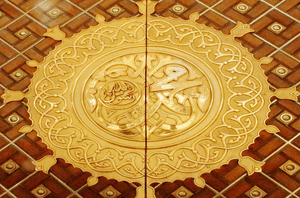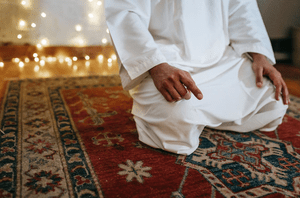Allah (subḥānahū wa taʿālā) says:
قَدْ أَفْلَحَ الْمُؤْمِنُوْنَ ، الَّذِيْنَ هُمْ فِْى صَلَاتِهِمْ خَـٰشِعُوْنَ
“Successful indeed are the believers, who are humble in their ṣalāh…” (23:1-2).
The above āyāt mark the beginning of Sūrah al-Mu’minūn. In these āyāt, Allah describes the qualities of the successful believers. The passage starts off by mentioning those ‘who are humble in their ṣalah’, and ends with the ninth āyah mentioning those ‘who consistently maintain their prayers’. Thus, ṣalāḥ features in both the beginning and the end of the list, demonstrating its great significance.
Ibn Kathīr (raḥimahullāh) explained this āyah: “Khushūʿ (humility) in ṣalāh is only attained by the one who has completely emptied his heart for it, who fully occupies himself for it and does not pay attention to anything else besides it, and who prioritises it over everything else. At that point it becomes a source of comfort and intense joy.”
Establishing Salah
Similarly, Allah says,
وَيُقِيْمُوْنَ الصَّلَوٰةَ
“…and they establish ṣalāh” (2:3).
The use of the word iqāmah (to ‘establish’ the prayer) is significant. The words ‘do’ or ‘perform’ ṣalāh have not been used here since it is not sufficient to complete just the outward motions. However, when you ‘establish’ ṣalāh, you complete both the inner and outer aspects of this noble worship. The outer aspects involve carrying out its pillars, obligatory acts and prerequisites; whilst the inner aspects refer to attaining the essence of ṣalāh, namely, khushūʿ. These acts should be conducted in tandem with pondering on the meaning of the utterances and actions during ṣalāh. (Adapted from Tafsīr al-Saʿdī)
Khushu: The First Loss of the Ummah
The Prophet ﷺ stated, “The first thing to be lifted from this ummah will be khushūʿ, until you will not find anyone with khushūʿ” (Ṭabarānī).
Ḥudhayfah (raḍiy Allāhu ‘anhu) said, “The first thing you will lose of your religion will be khushūʿ and the last thing you will lose of your religion will be ṣalāh. There may be a person praying yet there is no goodness in him. Soon a time will come when you will enter a large Masjid and not see a single person with khushūʿ in it.”
The Prophet ﷺ said, “Indeed a person may pray for sixty years, yet not a single ṣalāh of his will be accepted. Perhaps he perfected the rukūʿ but not the sujūd, or he perfected the sujūd but not the rukūʿ” (Ibn Abī Shaybah).
“Two rakʿahs with contemplation are better than standing up for the entire night with an inattentive heart.” – ʿAbdullāh b. ʿAbbās (radiy Allāhu ʿanhumā)
Ibn al-Qayyim (raḥimahullāh) compared khushūʿ in ṣalāh to the soul in the body. When the soul leaves the body, the body dies. Similarly, without khushūʿ the ṣalāh lacks its soul, spirit and essence. Likewise, praying ṣalāh without khushūʿ is like gifting a dead servant to a king. He then writes, “Allah (subḥānahū wa taʿālā) will neither accept it nor reward him for it, even if the obligation (of ṣalāh) has been legally fulfilled.”
Once Imām al-Bukhārī (raḥimahullāh) was praying and a wasp stung him 17 times. On completing his ṣalāh, he said, “Look at what troubled me during my ṣalāh.” They looked and found that the wasp had stung him in 17 parts of his body. Despite this, he carried on praying. It has been said that this was a voluntary prayer after Ẓuhr. After he finished praying, it was said to him, “Why did you not stop your ṣalāh when it started stinging you?” He replied, “I was reciting a sūrah and I wanted to complete it.”
Is It Not Enough That I Pray Five Times A Day?
“At least I’m praying.”
“I’m happy with where I am. I’m praying 5 times a day. I pray on time and I’m content with that.”
You should certainly feel happy and grateful that Allah (ʿazza wa jall) has granted you the gift of praying your farḍ prayers, particularly if you have previously been unable to do so.
However, this should not be enough. Even if the obligation of ṣalāh has legally been fulfilled, praying ṣalāh without khushūʿ will lead you to missing out on the essence of ṣalāh.
Imām al-Ghazālī (raḥimahullāh) wrote: “The goal of reciting the Qur’ān and the adhkār (in salāh) is praise, exaltation, asking and humility: and the One being addressed is Allah. However, whoever’s heart is covered by heedlessness is veiled from Him; thus, he does not see or experience consciousness of Him. He is heedless of the One to whom he is speaking with, and his tongue simply moves out of habit. How far is this from the purpose of prayer, which was ordained to purify the heart, renew the remembrance of Allah, and firmly tie the rope of īmān.”
In Sūrah al-Wāqiʿah, Allah (ʿazza wa jall) describes three groups of people: the people of the left (destined for Hell-fire), the people of the right (destined for Paradise), and finally the elite of Paradise (destined for the super-luxurious premium Paradise). It is this latter group who will be the closest to Allah, blessed to see Him most often, and have the Prophets and the Companions as their neighbours. They are the ‘Sābiqūn’ (the forerunners).
Your goal and duʿā’ in life should be that Allah (ʿazza wa jall) resurrects you amongst the Sābiqūn. If you wish to enjoy this premium Paradise in the hereafter, then your ṣalāh (and other acts of worship) should be of premium quality. An average or mediocre ṣalāh is not enough.
A believer always aims for the best. Thus, the Prophet ﷺ explained that when making duʿā’, ask Allah for al-Firdaws, because it is the highest Jannah (Bukhārī). He ﷺ also stated, “Indeed Allah loves that when one of you does something, he perfects it” (Ṭabarānī).
Do not become satisfied with the quantity and quality of your worship. Do not placate your inner self (nafs) with weak excuses! Do not believe that the ʿibādah you are doing is sufficient. Rather, reflect on your shortcomings, battle your nafs and ask Allah to make your ṣalāh like the ṣalāh of the Messenger ﷺ.
“When the slave rectifies two of his qualities, everything else will be rectified: (1) his ṣalāh and (2) his tongue.” – Yunus b. ʿUbayd (raḥimahullāh)








